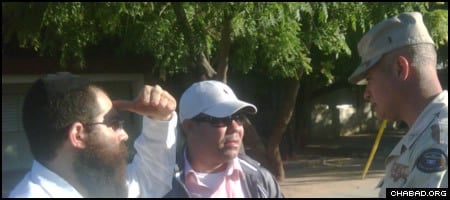With aid workers in place and more resources flowing into the devastated nation of Haiti, efforts at reviving its decimated populace kicked into high gear Friday and Saturday.
While rescue teams fought against the clock to free those trapped beneath piles of rubble in the capital of Port-au-Prince, medical personnel opened field hospitals to treat the wounded and foreign volunteers handed out food, water and water purification tablets.
Among the hundreds of volunteers and disaster relief professionals who have streamed into the country was Rabbi Shimon Pelman, director of Chabad-Lubavitch of the Dominican Republic. Arriving by jeep with a police delegation from the neighboring nation and an accompanying United Nations convoy, Pelman distributed truckloads of produce amassed by members of the 300 family-strong Jewish community in S. Domingo.
“There is a tremendous need in Port-au-Prince,” he said. “They don’t have anything. Everyone is asking for food and water.”
As he made his way by foot to Port-au-Prince’s airport to meet up with an airlift of supplies and personnel from Israel, the rabbi was inundated with requests from locals. Passing out food along the way, he tallied specific needs to communicate back to aid organizations.
“You can see it in their eyes,” said Pelman. “They’re thankful for surviving, but life has become a nightmare for them.
“People are dying in the streets waiting for medicine,” he added. “Everyone is trying to help, but more supplies are desperately needed.”
Speaking after his return to S. Domingo, the rabbi said that in the coming days he would be dispatching trucks stocked with water, basic food and medicine, in cooperation with diplomatic officials.
While Pelman was in Haiti, a pair of rabbinical students dispatched from New York helped manage the Chabad House and provide services for the Dominican Jewish community. Rabbi Mendel Zarchi, the Puerto Rico-based director of Chabad of the Caribbean, continued to field phone calls from Jewish doctors and aid personnel headed to the region and in need of kosher food.
Zarchi and his staff set up a relief fund in the days after the Jan. 12 earthquake and were also keeping people informed of development via the fund’s Web site.
The American Red Cross, one of dozens of international organizations that have mobilized in the wake of the 7.0-magnitude quake, reported that convoys arrived on Saturday carrying a 50-bed field hospital and purification equipment capable of producing 10,000 gallons of drinking water per day. But cargo flights carrying more equipment and supplies were diverted to the Dominican Republic, necessitating overland transport from S. Domingo and a delay of more than a day.
In some cases, relief came in the form of aid workers walking through the streets, handing out bottles of water.
“We are working with the Haitian Red Cross volunteers, who have intimate knowledge of the community,” said Steve McAndrew, a disaster relief specialist with the American Red Cross in Port-au-Prince. “Survivors are receiving aid from their neighbors, who they know and trust, with support from the international community.”
A team from the Israel Defense Force’s Medical Corps opened a field hospital on Saturday, The Jerusalem Post reported, and was treating dozens of patients at a time. Many of its cases were children with severe fractures.
The day before, Haitian Interior Minister Paul Antoine Bien-Aime warned reporters that the death toll could eventually reach 200,000.
“We have already collected around 50,000 dead bodies,” he said. “We anticipate there will be between 100,000 and 200,000 dead in total, although we will never know the exact number.”
Also on Friday, U.S. Homeland Security Sec. Janet Napolitano urged Americans to donate money to aid organizations in lieu of food and clothing.
“Monetary contributions from individual Americans,” she said, “are the best way to immediately support the relief efforts of those who are working around-the-clock to help save lives in Haiti.”







Join the Discussion